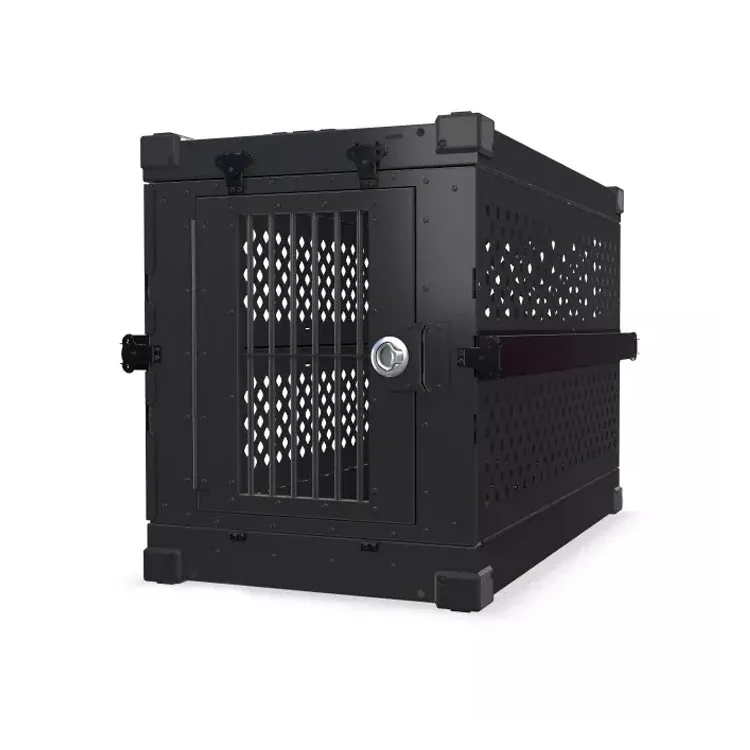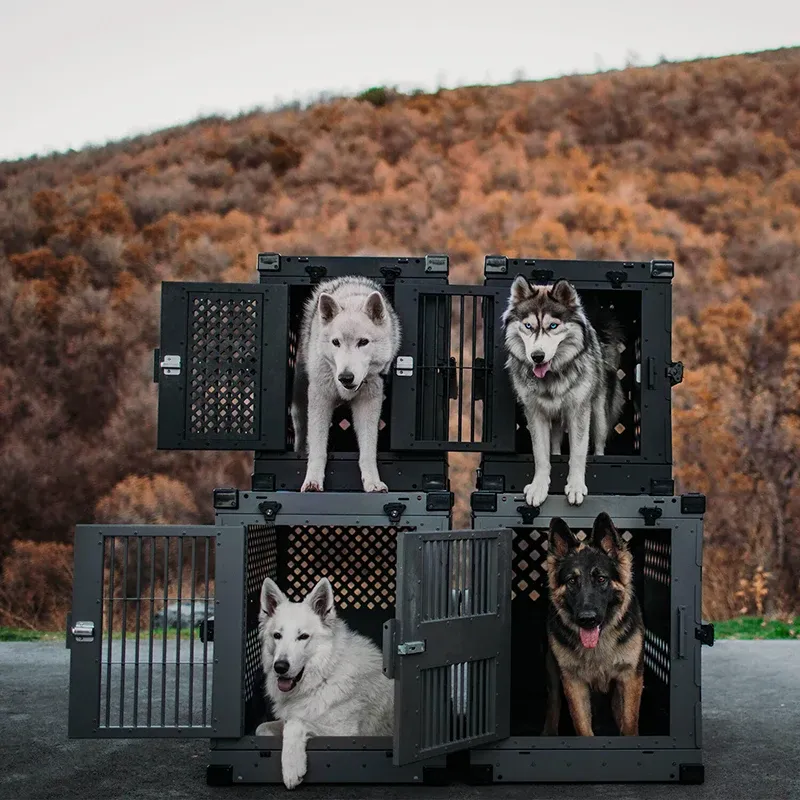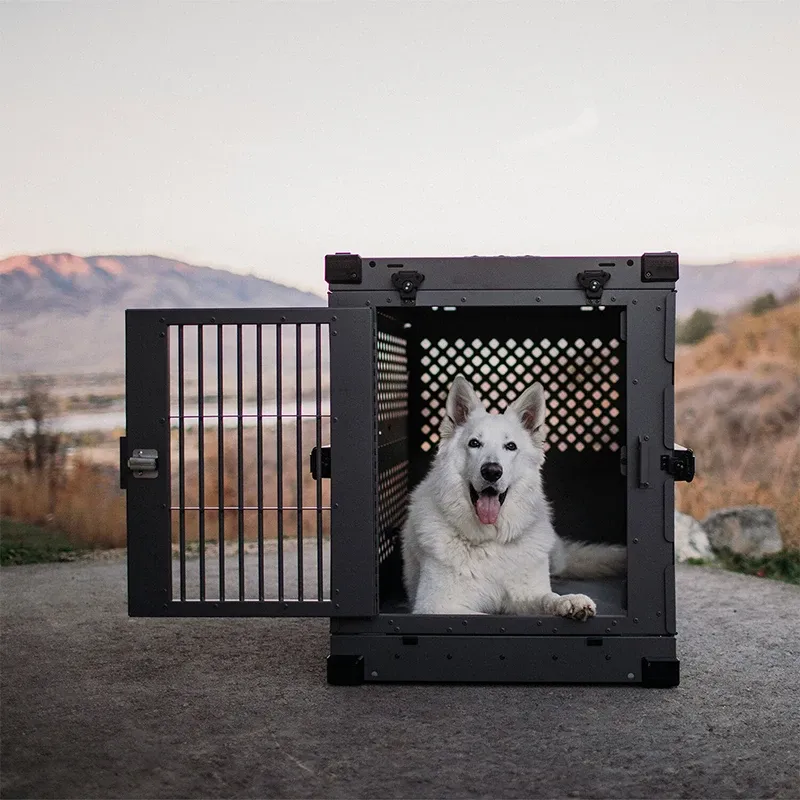





Aluminum Foldable Pet Dog Cage Collapsible Dog Travel Crate With Wheel And Grooming Arm
0
sales
Regular Price
$0.00
Regular Price
Sale Price
$680.00
Congrats! You are eligible for FREE Shipping
United States
Size
24inch*18inch*22inch
30inch*20inch*22inch
34inch*23inch*28inch
40inch*23inch*29inch
48inch*26inch*33inch
Anxiety is a mental health condition that is widely discussed nowadays. Fortunately, in recent years, we’ve made tremendous strides as a society to destigmatize mental health disorders, allowing for many open discussions and sharing of resources. Unfortunately, anxiety disorders remain one of the most common mental health disorders worldwide, affecting millions of people. However, a lesser discussed subject is the prevalence of mental health conditions in our pets. Yes, just like us, animals can experience mental health issues. When focusing on dogs in particular, anxiety is one of the most common mental health conditions affecting our beloved pups. So what exactly is dog anxiety and what are the key signs to look out for?
Anxiety in Dogs
Dog anxiety is a complicated mental health condition that can manifest in various ways, making it essential for dog owners to recognize the key signs. Dogs may experience anxiety due to various triggers, both environmental and situational. New surroundings or a change in their daily routine- such as added stressors, are common causes of anxiety within dogs. While dogs may be unable to verbally communicate in a language that us humans understand, there are ways that dog owners can recognize signs of anxiety in their pups. One common sign of anxiety in dogs is excessive barking, whining, or howling. Another telltale sign of anxiety is destructive behavior. Dogs may engage in chewing, scratching, or other destructive habits as a coping mechanism for their anxiety. This behavior can result in damage to furniture, walls, doors, and other household items. Not only that, but there are many opportunities for dogs to get into trouble or seriously hurt themselves when experiencing extreme anxiety. One of the most common forms of anxiety in dogs is separation anxiety, which occurs when a dog becomes distressed or anxious when separated from their owner or when left alone. Dogs suffering from separation anxiety may exhibit different symptoms than dogs suffering from generalized anxiety, as separation anxiety is most commonly triggered by fears of abandonment. However, every dog is different, so it's crucial that dog owners pay attention to changes in their pup’s behavior or mood.
The Hidden Costs of Dog Anxiety
Unfortunately, anxious dogs can wreak havoc on a household, causing significant damage to your home and your wallet. While the destructive behaviors exhibited by anxious dogs can range from mild to severe, they almost certainly cause some degree of household damage. For example, one of the most common ways anxious dogs damage homes is through chewing. Whether it's gnawing on furniture, chewing through electrical cords, or tearing apart pillows and cushions, dogs experiencing anxiety may turn to chewing as a way to try to alleviate their stress. In addition to chewing, anxious dogs may occupy themselves by scratching floors, walls, doors, and other surfaces. In both of these situations, your home can be left with pretty serious damage. Destroyed couch cushions, scratched floors, and chewed up baseboards are just a few examples of ways that dog anxiety can have an impact on a home. Not only are these damages likely very frustrating for dog owners, but they can also come with certain financial consequences. The financial toll of dealing with the aftermath of a destructive dog's behavior can present a massive burden for dog owners. Replacing broken furniture or even repairing superficial scratches can all add up quite quickly. Unfortunately, without a dog’s anxiety being managed, these anxiety-induced destruction will likely continue. Thus, costly home damage is likely to continue as well.
Anxiety in dogs not only poses risks to your homes but also to the physical well-being of the dogs themselves. That being said, it is quite common for anxious dogs to sustain serious injuries that require veterinary care. Anxious dogs may engage in different risky behaviors as they attempt to cope with their stress, which provides numerous opportunities for them to get injured. While chewing up furniture may just seem annoying to most dog owners, this destructive behavior may be more concerning than you initially thought. Through this anxious habit, dogs can easily lose teeth, get objects lodged in their mouths, and sustain other injuries. Not only that, but there are many other common chewing targets for dogs that can pose serious risks. For example, perhaps a dog owner forgot to put away some cleaning supplies they were using on the countertops earlier. Well, an anxious dog might occupy themselves by chewing these bottles, exposing themselves to very dangerous chemicals in the process.
Furthermore, anxious dogs may engage in other behaviors that can result in a variety of different injuries, including lacerations or broken bones. In many of these cases, it may be necessary to seek out veterinary care. As every dog owner knows, vet bills can easily become quite expensive. Emergency veterinary visits, medications, and any operations resulting from anxious behavior can cause a serious financial burden for pet owners. Not only that, but dog owners may incur additional costs for any ongoing medical care. That being said, anxiety in dogs is much more dangerous than many dog owners may realize, as anxious behaviors can pose serious risks to your home and your pet.
Why Wire and Plastic Dog Crates Fail
When your precious pup is suffering from anxiety, you’re likely going to want to do everything you can to help them. One of the best and most effective tools for managing anxiety in dogs is by providing them with a safe and secure space to decompress; a dog crate. However, oftentimes, investing in the wrong crate can be a very costly mistake. Anxious dogs can often outsmart and destroy traditional wire or plastic dog crates. While these crates may serve their purpose for some dogs, they are often ineffective at holding up against anxious or destructive behavior. Anxious dogs are much more likely to pursue dramatic escape attempts, leading to damaged crates and potential injuries. Furthermore, this can be another big blow to your wallet, as your dog’s costly crate is now beyond repair.
Flimsy wire or plastic crates are simply no match for anxious or destructive dogs, which can often lead to a cycle of buying and replacing many poorly made dog crates. However, there is a much more serious risk with choosing poor quality crates. Dogs may bend or break the bars of the crate in their attempts to escape, risking injury in the process. Additionally, even light pressure against a wire crate can cause a wire to come loose, something that can easily hurt your dog. Plastic dog crates also offer the same poor build quality and protection for dogs, allowing for many escape-related injuries. That being said, choosing wire or plastic crates for anxious dogs is not advised, as you’re much more likely to have wasted money on a product that will only last a few uses. Continually having to replace broken crates can be very expensive, and the situation can be worsened by crate-caused injuries as well.
Prioritizing the Safety and Security of Your Anxious Pup
As exemplified above, it's crucial for owners to recognize the signs of anxiety in their dogs early on and take proactive steps to address their pet's anxiety. Investing in a secure and durable dog crate is the most effective way to ensure your dog’s safety and the safety of your home. That being said, not every dog crate is tailored to meet the needs of anxious dogs. Dog owners should choose to invest in a dog crate that is specifically designed for anxious or destructive dogs, as this will bring you peace of mind knowing that your beloved pup is receiving the maximum protection. With a secure crate, dog owners have confidence knowing their four-legged friend is in a comfortable environment- and not wreaking havoc on the couch cushions.
By investing in an Impact High Anxiety Dog Crate, dog owners can avoid the frustration and financial burden of having to continuously repurchase wire or plastic crates. Furthermore, even a one time trip to the veterinarian can be quite costly. With anxious dogs, many owners, unfortunately, have to make multiple trips to the vet due to anxiety-induced injuries. Investing in a secure crate puts an end to the dangerous destructive, and thus stops all expensive vet trips as well.
The peace of mind that comes with knowing your anxious dog is safe is priceless. Especially when there are circumstances when you’re leaving your pup at home alone, having confidence that they are safe and out of harm's way is a massive relief. After investing in a heavy duty dog crate, there will be no more worrying about what destruction you will find in your home or what injury your dog will sustain from their next crate escape attempt. Instead, you’ll have complete assurance that the health and wellbeing of your loyal companion is being prioritized. As every dog owner knows, that feeling is invaluable.


